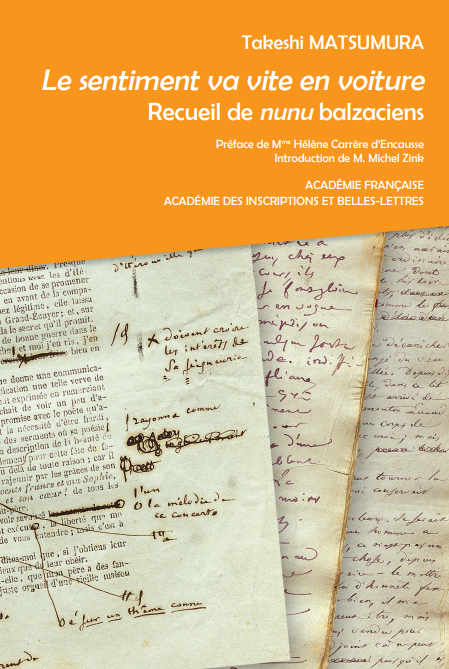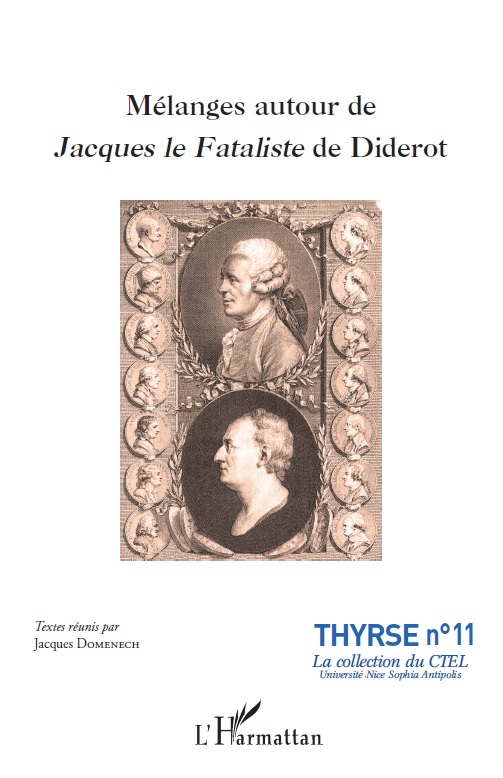
Title
Le sentiment va vite en voiture Recueil de nunu balzaciens
Size
288 pages
Language
French
Released
2022
ISBN
9782877546829
Published by
Académie française / Académie des Inscriptions et Belles-Lettres (diffusion Peeters)
Book Info
See Book Availability at Library
Japanese Page
This book focuses on some of the words and expressions the 19th-century French writer Balzac, who authored La Comédie Humaine, used, and hypothesizes that the interpretations attributed to them conventionally are not necessarily correct. The book posits that, although Balzac's works have been extensively examined since the late 19th century, the literature, politics, geography, and history of the French language of the time have not been sufficiently explored in detail.
To take an example, Le Père Goriot, published in 1835, contains the word idémiste. The word is used to describe Poiret's personality, and is understood through Poiret's words and actions to mean "a person who doesn't have opinions of their own, and always follows what others say." The word has been attributed to Balzac since the late 19th century, cited as a prime example of the author's bad penchant for creating words. Well-known researchers such as Leo Spitzer, the expert scholar of stylistics, Charles Bruneau, a professor at the University of Sorbonne and an authority on the history of the French language, and Pierre-Georges Castex, a professor at the same university and a major authority on 19th-century literary studies, as well as their pupils, have all made the same point.
Wondering about the lack of presented evidence, I referred to Walther von Wartburg's Französisches Etymologisches Wörterbuch, which is the first source when researching the history of French vocabulary, and "idémiste" is listed in the fourth volume published in 1951 of this 25-volume dictionary published between 1922 and 2002. We can therefore confirm that the etymology of this word is from the Latin idem, meaning "same," and at the same time, it has been used as an adjective and noun since 1704 in the sense of "people who do not speak their opinions in a discussion, and just say idem." Who, then, of the Balzac researchers and Waldburg, is the accurate source? Verifying the examples, it is clear that the latter is correct. In other words, none of the researchers of Balzac of the second half of the 20th century questioned previous researchers, or consulted the Französisches Etymologisches Wörterbuch. Knowing that Balzac did not coin this word alters the linguistic outlook about this author.
This example demonstrates how researchers can inadvertently become idémiste. We encourage our readers to learn how to supplement the work of their predecessors even as they respect it, taking into consideration other words and expressions covered in this book.
(Written by MATSUMURA Takeshi, Professor, Graduate School of Arts and Sciences / 2023)
Table of Contents
Introduction par Monsieur Michel Zink.
Avant-propos.
Abréviations.
1. Poiret l’idémiste.
2. Quinze cents francs et ma Sophie.
3. Faire de l’usure avec Dieu.
4. L’honneur de la France vestimentale.
5. Mangez un veau le vendredi ; mais soyez chrétien !
6. Les parvenus sont comme les singes.
7. Il faut mettre les points sur les i, saquerlotte !
8. Le langage puissant et brusque d’un bourguignon.
9. Ne fais pas le prince, si tu n’as pas appris à l’être.
10. Voir, n’est-ce pas avoir ?
11. Les femmes sont des poêles à dessus de marbre.
12. Le sentiment va vite en voiture.
13. Le nez à la Roxelane.
14. La triture des affaires.
15. Vous êtes bien curieux, mon cher.
16. N’interromps pas une femme qui danse.
17. Faire décanicher Birotteau de mon lit.
18. Les astronomes vivaient d’araignées.
19. Tous les nunu de la vie de ma chère Ève.
20. Certains passent leur vie en Balzacie.
Bibliographie.
Index lexical.
Index des noms propres.
Table des illustrations.
Related Info
Académie française / Académie des Inscriptions et Belles-Lettres le 6 oct. 2022
https://www.academie-francaise.fr/actualites/presentation-de-louvrage-du-professeur-takeshi-matsumura-le-sentiment-va-vite-en-voiture



 Find a book
Find a book




